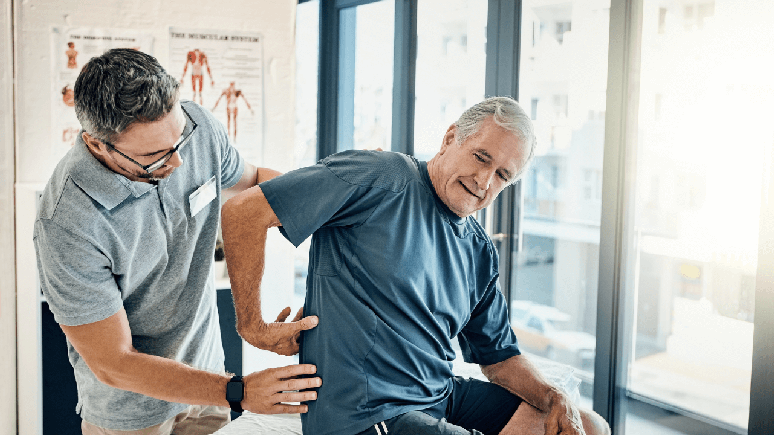The expert explains how lifestyle can influence the manifestation of pain
Performing daily activities such as sitting or bending over is a simple practice for most people. However, they can become a challenge for people who suffer from them pain in the buttocks. This is because this discomfort can be associated with more complex problems involving the column and the sciatic nerve.
According to a survey by the Ministry of Social Security in 2023, it was found that more than 2.5 million Brazilians took a break from work due to spinal problems. Lumbar disc herniation was responsible for 51,453 cases of temporary disability, followed by low back pain with 46,964 absences.
These alarming numbers are i reflection of diseases that originate from everyday symptoms and can degenerate into more serious problems. In this sense, it is essential to seek professional treatment evaluation as soon as signs appear, to avoid further complications.
According to Luciano Miller, a doctor specializing in spine surgery, the symptoms are often more complex than you might imagine. “Pain radiating from the lower back to the back of the thigh and leg, tingling or numbness, and pain that worsens when sitting are common symptoms.”
Prevention
The professional also explains that the lifestyle It has a direct impact on spinal health. This is the case, for example, of posture in the workplace and the frequent use of high heels. “Remaining seated for long periods in an inadequate posture can increase pressure on the spine.”
In addition to causal factors, it is essential to understand the impact of pain, which can become disabling. The objective, therefore, is to carry out the correct treatment and prevent the worsening of conditions that compromise the patient’s daily life.
“Prevention is essential to prevent initial symptoms, such as butt pain, from evolving into more serious conditions, such as a herniated disc. We recommend regular strengthening and stretching exercises, as well as posture care, to maintain spinal health spinal during the day”, underlines the specialist.
Treatment
From diagnosis onwards, understanding the dynamics that connect gluteal pain to other problems resulting from it paves the way for more effective interventions. Therefore it is possible to improve the quality of life of patients using a multidisciplinary approach, combining medical assessment, physiotherapy and lifestyle changes.
“It is essential that treatment is personalized, taking into account the specific needs of each patient. This way we can offer patients a personalized treatment plan that not only relieves pain, but also prevents its recurrence, promoting spinal health long term,” he explains.
Furthermore, practicing physical activity is essential, since it is a measure that reduces the risk of back problems. “Core strengthening exercises and specific stretches can help prevent nerve compression and relieve symptoms,” suggests the spine specialist.
Healthy habits that affect the spine
Watching out for butt pain is the first step to addressing more serious problems, such as back problems. Before medical monitoring and adopting a balanced life is possible relieve symptoms AND prevent other complications. Therefore, check out below some habits that can be beneficial, helping to promote quality of life.
1. Maintain correct posture: Make sure your spine is aligned when you sit, stand or walk.
2. Strengthen your core: Practice exercises that strengthen your abdominal and lower back muscles.
3. Stretching: Incorporate stretching exercises to increase flexibility in the spine and surrounding muscles.
4. Wear comfortable shoes: avoid prolonged use of high heels and opt for shoes that offer adequate support.
5. Adapt your work environment: Make sure your workstation is ergonomic, with an eye-level monitor and an adjustable chair.
6. Lift objects correctly: bend your knees and use the strength of your legs, keeping the object close to your body.
7. Limit sitting time: get up and move around regularly to avoid prolonged pressure on the spine.
8. Engage in regular physical activity: Choose low-impact exercises, such as walking or swimming, to maintain your body’s overall health.
9. Sleep well: use a mattress and pillows that adequately support your spine.
10. Maintain a healthy weight: Excess weight can increase pressure on the spine, so maintain a balanced and healthy diet.
Source: Terra
Ben Stock is a lifestyle journalist and author at Gossipify. He writes about topics such as health, wellness, travel, food and home decor. He provides practical advice and inspiration to improve well-being, keeps readers up to date with latest lifestyle news and trends, known for his engaging writing style, in-depth analysis and unique perspectives.








